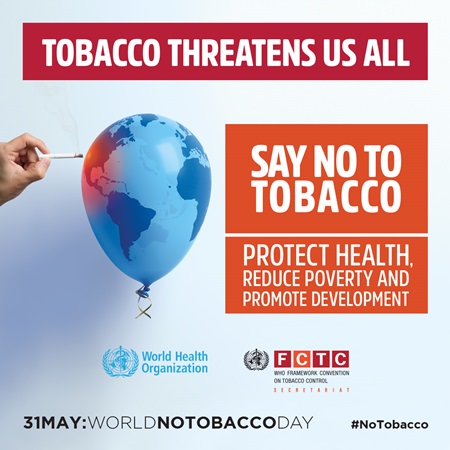
NONTHABURI – Action to stamp out tobacco use can help countries prevent millions of people from falling ill and dying of tobacco related disease, combat poverty and protect the environment. On World No Tobacco Day 2017, the World Health Organization (WHO) is highlighting how tobacco threatens the development of nations worldwide, and is calling on governments to take strong action to curb tobacco use.
Around the world, tobacco consumption kills more than 7 million people each year and costs households and governments over US$ 1.4 trillion spent on health care and from lost productivity.
Tobacco consumption is very high in Thailand. One in five adult Thais and one out of six Thai youth smoke.That is almost 11 million smokers. Tobacco is a key risk factor for many diseases, such as cancer, heart disease, diabetes and tuberculosis—these illnesses put financial strain on families and drain Government’s budget for universal health coverage.
In addition to the immense health burden, tobacco use hinders development by exacerbating poverty and hunger, damaging the environment, and negatively Tobacco use disproportionately affects the most vulnerable populations, namely, children, women and the poor.
“Tobacco is a major barrier to development globally,” says Dr Daniel Kertesz, WHO representative to Thailand. “Tobacco?related death and illness are drivers of poverty, leaving households without breadwinners, diverting limited household resources to purchase tobacco products rather than food and school materials, and forcing many people to pay for medical expenses.”
Dr Kertesz adds: “But by taking robust tobacco control measures, governments can safeguard their country’s futures by protecting people’s health, generating revenues to fund health and other social services, and saving their environments from the ravages tobacco causes.”
All countries have committed to the 2030 Agenda for Sustainable Development, which aims to strengthen universal peace and eradicate poverty. Recognizing that actions to control tobacco boost development, the Sustainable Development Goals call for accelerating the implementation of the WHO Framework Convention for Tobacco Control (WHO FCTC), specifically: protecting people from exposure to tobacco smoke, banning tobacco advertising, promotion and sponsorship, banning sales to minors, requiring health warnings on tobacco packaging, promoting tobacco cessation, increasing tobacco taxes and creating a national coordinating mechanism for tobacco control.
Thailand’s new Tobacco Products Control Act 2017 recently passed by the government of Thailand is a commendable legislation that incorporates guidelines recommended by WHO FCTC. When implemented effectively, this Act will help to reduce tobacco consumption, thereby protecting the health of Thai people, fighting poverty, generating revenues, and protecting the environment, thus paving the way for sustainable development of the nation.




